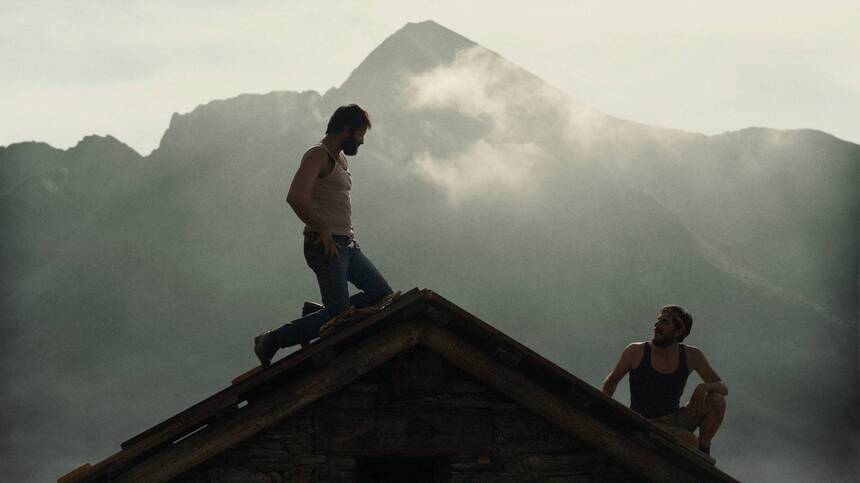THE EIGHT MOUNTAINS Review: Of Men and Friendship
Felix van Gronigen and Charlotte Vandermeersch directed; Luca Marinelli and Alessandro Borghi star in an an affecting epic tale of male friendship that is quite rare to see in films these days.

Based on Paolo Gognetti's book of the same title, Belgian filmmakers duo Felix van Gronigen and Charlotte Vandermeersch (The Broken Circle Breakdown)'s The Eight Mountains is an affecting epic tale of male friendship that is quite rare to see in films these days.
Shot in fitting full frame by Titane and Raw DP Ruben Impens, highlighting the majestic alpine peaks of Northern Italy, van Gronigen and Vandermeersch go on unhurriedly, telling the life-long friendship of Pietro (Luca Marinelli, Martin Eden, The Old Guard) and Bruno (Alessandro Borghi).
Narrated by an older Pietro, who would eventually become a writer, the film starts with him as an 11-year-old city boy from Turin spending his summer vacation with his parents up in the rural mountain regions. He befriends Bruno, who describes himself as the only child left in the region, because everyone has left to look for work in the city, including his father, as farming is a dying profession.
Pietro's father, an engineer from the city, who secretly dreams about living the care-free life in nature, brings his family back to the mountains year after year. And the two boys' friendship grows.
The scenes where two boys forge their friendship -- swimming in the pristine alpine lake, playing in the field and hiking in the stunning mountain vistas -- are really something to behold. And these are innocent times, when children are less aware of their position in society and class differences.
Because of their budding friendship, Pietro's parents ask Bruno's guardians (uncle and his wife, who are cheesemakers) to take Bruno with them to Turin to get educated. In young Pietro's mind, it doesn't make sense: why do they want to take Bruno into the city life they always complain about? And why would Bruno even want to leave these heavenly, carefree surroundings?
The move doesn't happen when Bruno's father, a brick layer who's rarely around, refuses the offer. And they stop going back to the mountain for vacation, partly because Pietro is now a teen and going through a rebellious stage, and resents his father, who is a salaryman, married to his work.
After the death of Pietro's father, their friendship re-emerges, now they are both bearded 30-something men and supposedly all grown up. Pietro finds Bruno waiting in the mountain village and takes him straight to an abandoned ruin of a cabin that they once stayed as children, while they were hiking with Pietro's father.
Pietro learns that his father and Bruno kept in touch all those years. It turns out that his father had been helping Bruno, and sharing their love of the mountains, hiking together. That it was his wish for them to rebuild the cabin. And it dawns on Pietro that Bruno became a surrogate son to his father.
He finds his father's journal on the top of 'Grana,' one of the mountain peaks they frequented, detailing his thoughts and wishes, and how he wanted to live more freely. Pietro, who has not found the path in life and struggling, accepts the challenge, and the two men work on building the cabin together that summer. It will be their summer house.
It is one of Pietro's girlfriends, who hooks up with Bruno upon visiting there and eventually starts a family with him in the mountains. Pietro laments how Bruno has found his path in life and he himself has not. But now Bruno has to contend with a struggling cheese-making business & a family to care for. The mountain life is not as carefree as when they were children.
In the meantime, Pietro, searching for the meaning of life, finds it in writing and the Himalayan mountains in Nepal. But their friendship continues, as he comes back, time and time again to spend his summer days in the cabin.
It is Bruno who calls Pietro for help when life gets to be too much. Pietro comes back to the cabin from Nepal without hesitation. They argue about how to live life and say hurtful things to each other. And Bruno decides to spend the winter in the cabin alone.
The strength of The Eight Mountains is its complex depiction of a male friendship. It speaks volumes in their knowing glances and silences as they spend time together up in the mountains.
Our circumstances change but the mountains don't. It illustrates men's ultimate desire and to retreat from the human world and finding it futile.
As they grow older, Pietro and Bruno understand this connundrum, and take refuge in each other's company. This all sounds corny as hell in words, but van Gronigen and Vandermeersch's earnest approach works beautifully, with awe-inspiring views of nature and superb, stoic acting by the two leads. Swedish singer Daniel Norgren's soulful, melancholic soundtrack does here what Leonard Cohen did for McCabe & Mrs. Miller. The film is one of the year's best.
The Eight Mountains opens Friday, April 28 in New York at Film at Lincoln Center and Angelika Film Center, with a national rollout to follow. Visit the official site for more information.
Dustin Chang is a freelance writer. His musings and opinions on everything cinema and beyond can be found at www.dustinchang.com
The Eight Mountains
Director(s)
- Felix van Groeningen
- Charlotte Vandermeersch
Writer(s)
- Paolo Cognetti
- Charlotte Vandermeersch
- Felix van Groeningen
Cast
- Luca Marinelli
- Alessandro Borghi
- Lupo Barbiero







